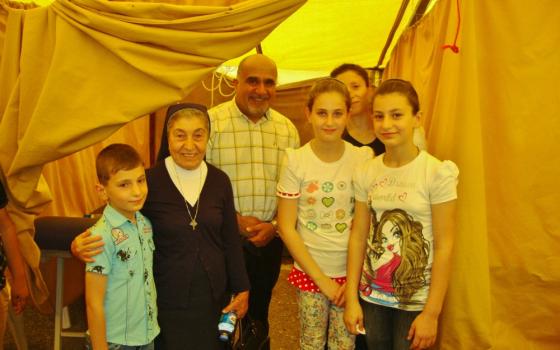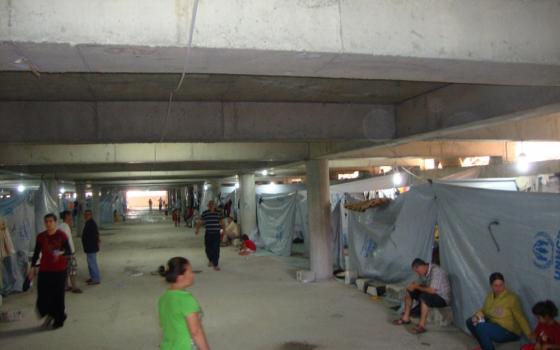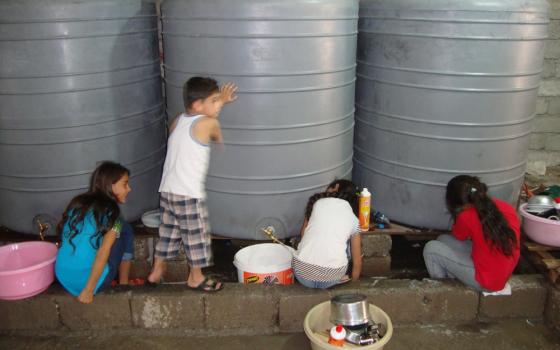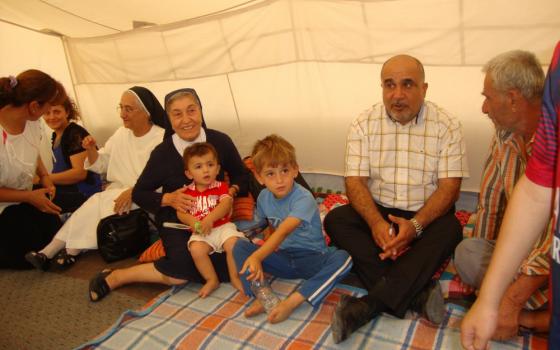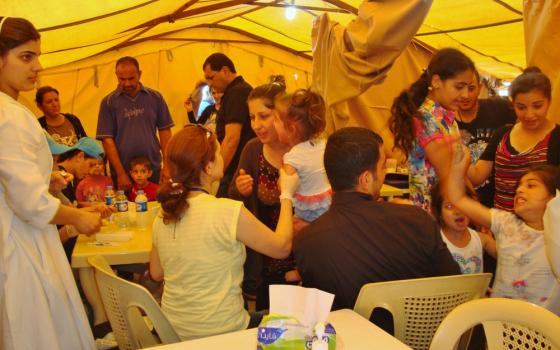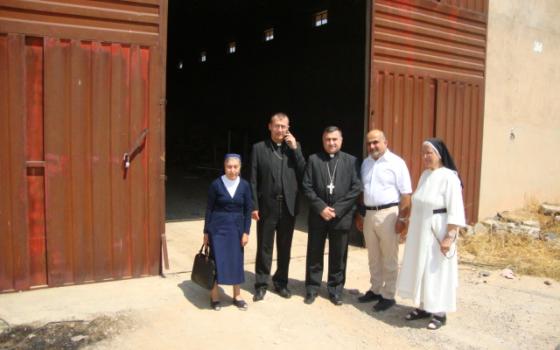Editor’s Note: Since August thousands of Iraqi Christians have been fleeing from cities and towns invaded by the self-proclaimed Caliphate, the Islamic State of Iraq and Syria (ISIS.) They are arriving in the area of Erbil, notably the suburb of Ain Kawa (Ainkawa), which is midway between Mosul and Kirkuk.
On Sept. 8 the United Nations High Commissioner for Human Rights, Mr. Zeid Ra’ad Al Hussein, in the first speech from his office defined that the first priority “of the international community should be to halt the increasingly conjoined conflicts in Iraq and Syria. In particular, dedicated efforts are urgently needed to protect religious and ethnic groups, children – who are at risk of forcible recruitment and sexual violence – and women, who have been the targets of severe restrictions.”
True to form, woman religious in the Mideast are responding to the crisis in Iraq and focusing on the long term needs. A delegation from the Catholic Near East Welfare Association (CNEWA) visited Erbil September 2-5 to learn the reality of the Iraqi Christians and offer solidarity. Sr. Marie Claude Naddaf, Provincial Leader of Good Shepherd Congregation in Lebanon-Syria, was the elected delegate-representative for the Women’s Assembly of Major Superiors of Lebanon. Naddaf was an apt choice for this mission. She already had extensive experience when she was a leader in Syria and was instrumental in mobilizing a large social service response as hundreds of thousands of Iraqi refugees poured into Damascus following the 2003 U.S. invasion of Iraq.
The delegation began with heavy hearts, troubled with information about the recent displacement of at least 150,000 Christians in a just a few days, most from the Christian area of Qaraqosh. The delegates’ goal was clear and simple: to be a sign of Jesus' compassion for displaced brothers and sisters and especially for religious who had lost and suffered so much to arrive at Ain Kawa. The Christians have nowhere to turn but to their churches, which are rather depleted; the bishops, priests and sisters who are helping are all exhausted.
After communal prayer on the first morning, the delegation met with priests, brothers and nuns who are working in the many places refugees have gathered – public parks, tents, public school buildings (they will shortly be evicted from these as the new school year beings)and underground nooks and crannies. After the meeting sisters and priest, delegation members and those working on the ground, went out two by two, disciple-like, to various places.
They encountered scenes of desperate people gathering – some registering their displacement, others waiting for vaccines in medical tents, some not sure what they could or should be doing. The most obvious and urgent need was for shelter. Among the displaced were scores of Dominican sisters, a number of religious from the Congregation of Daughters of Mary (Chaldean), Sisters of the Sacred Heart (Chaldean), Franciscan Sisters of the Immaculate Conception, and Little Sisters of Jesus. The various congregations are living together, some in a seminary building and others in shipping containers being installed at the Dominican sisters’ property. Msgr. Boutros Moshe, archbishop of Mosul who was displaced from Qaraqosh, has a small apartment, shared with 20 persons, various ones taking turns sleeping in shifts due to limited mattresses and space. It seems there is no clear distinction among the religious of who is a refugee and who is a service provider – it has all become one and the same.
As a Good Shepherd Sister, whose special mission is towards women and girls, Sr. Marie Claude gravitated toward the most vulnerable among the displaced – pregnant women giving birth in tents or in public parks. They have nothing to give their newborns, only a few pieces of cloth that some have prepared as a trousseau. She thinks with bitterness of the fine garments lavished upon infants in the powerful nations where there is a choice to respond or not respond to these people in crisis. She also notes that young girls, because of customs and culture, are confined to tents in this new and makeshift environment. She was able to work with one of the local sisters to organize a group for the girls that can continue to meet two or three times a week to give them a safe and acceptable place to be outside and have some socialization.
The account of chaos and misery could go on and on. But what to make of it? Sr. Marie Claude says that she suffers the same emotions that spring from the heart of the displaced. She wants to talk about this harsh reality so that everyone can understand. Even so, she says “no words can express the tragedy of sisters uprooted from their land, culture, civilizations, torn from their own history, expelled to be exiles in a remote place, rejected.” And she wonders, “Can anyone understand the words I just wrote?” She feels that the world has already forgotten about this tragedy. Still she prays and she appeals: “My sister, I appeal to all countries of the world to find a solution of protection so that these families can return to their towns and villages and live in dignity.” Now it is our turn to listen.
[Sr. Clare Nolan is the International Justice Training Coordinator for the Sisters of the Good Shepherd, an international woman’s religious congregation that is involved n providing social services in about 70 counties, with a particular focus on women and girls in vulnerable situations.]
Related - 'It pierced my heart like a knife,' nun says after visit to Iraqis by Doreen Abi Raad, Catholic News Service.
